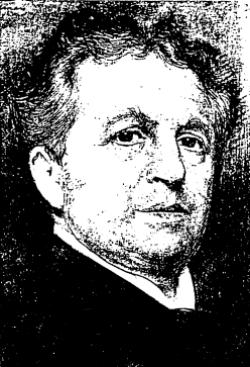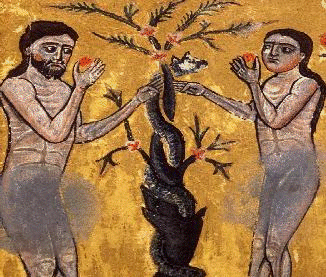 Abraham Kuyper has many extended anecdotes on Adam, especially in regards to our Anthropology (i.e. What is Man?) that were through his Encyclopedia of Sacred Theology. I've gathered three extended quotes from this book and shared them here.
Abraham Kuyper has many extended anecdotes on Adam, especially in regards to our Anthropology (i.e. What is Man?) that were through his Encyclopedia of Sacred Theology. I've gathered three extended quotes from this book and shared them here.
Kuyper viewed the resurrection as a restoration of Adam to his pre-Fall (antelapsarianism?) , yet improved and completed in Christ. Kuyper taught that Adam knew God through Natural Revelation in a way that is not possible now due to the Fall. Kuyper also believed that it was necessary for Jesus Christ to be a descendant of Adam, so that he would essentially restore Adam's body to the pre-Fallen state.
Kuyper on Adam's Knowledge of Himself and the Cosmos:
To make this clear we must go back a moment to the first man, who, in so far as he represented our entire race, was no individual, and in whose case we do not yet need to reckon with the relation in which we stand to other men. It is evident that, when thus taken, Adam possessed in himself, apart from the cosmos, everything that was necessary to have knowledge of God.
Undoubtedly many things concerning God were manifest to him in the cosmos also; without sin a great deal of God would have become manifest to him from his fellow-men; and through the process of his development, in connection with the cosmos, he would have obtained an ever richer revelation of God. But apart from all this acquired knowledge of God, he had in himself the capacity to draw knowledge of God from what had been revealed, as well as a rich revelation from which to draw that knowledge. Our older theologians called these two together the “concreate knowledge of God”; and correctly so, because here there was no logical activity which led to this knowledge of God, but this knowledge of God coincided with man’s own self-knowledge. This knowledge of God was given eo ipso in his own self-consciousness; it was not given as discursive knowledge, but as the immediate content of selfconsciousness. Even in our present degenerate condition, when much of ourselves can only be learned by observation, there is always a background of self-knowledge and of knowledge of our own existence, which is given immediately with our self-consciousness. Before the fall, when no darkening had yet taken place, this immediate self-knowledge must have been much more potent and clear. And thus it could not be otherwise but that in this clear and 187 immediate self-knowledge there was, without any further action of the logos in us, an equally immediate knowledge of God, the consciousness of which, from that very image itself, accompanied him who had been created in the image of God. Thus the first man lived in an innate knowledge of God, which was not yet understood, and much less expressed in words, just as our human heart in its first unfoldings has a knowledge of ideals, which, however, we are unable to explain or give a form to. Calvin called this the seed of religion (semen religionis), by which he indicated that this innate knowledge of God is an ineradicable property of human nature, a spiritual eye in us, the lens of which may be dimmed, but always so that the lens, and consequently the eye, remains.
pg 186-187, Abraham Kuyper, Encyclopedia of Sacred Theology
Kuyper on Adam's Knowledge of God derived from Nature before the Fall. (Kuyper seems to believe that Knowledge of God evident in Nature before the Fall but not after).
Hence this logical action also was included in innate theology; simply because otherwise it could have been no theology. This, however, should not be taken in the sense that Adam was created with some sort of a catechism in his head; for logical action presumes subjective action of the human mind. If, therefore, we should speak with entire accuracy, we should say that there was no increated theology in Adam, but that he was so created, that, in his awakening to selfconsciousness, he arrived of necessity at this original theology from the data that were present in him. In a literal sense respiration was not increated in Adam, for the first inhalation only came when the creation was completed, while before the creation was ended he could not draw breath. Breathing is an action of the person which comes only when the person exists. Since all the conditions for breathing are given in our nature, and every person born in this nature breathes of himself and from necessity, no one hesitates to acknowledge that respiration is inborn with us all. It were mere prudery, therefore, to object to the expression of innate or concreate theology; for though theology is the result of a logical action in the subject, with Adam this logical action took place immediately and from necessity; and it was by this alone that the receiving of an oral revelation was already possible in paradise. For it is plain that the entire representation which the Scripture gives us of the intercourse with God in paradise, of the fall and subsequent promise, becomes unintelligible and falls [190] away, if we assume in Adam exclusively the sense of the eternal, and deny him all conscious knowledge of God.
pg 189-190, Abraham Kuyper, Encyclopedia of Sacred Theology
 Kuyper on the Regenerated Adam. (Kuyper believed that the Second Adam [Jesus] resurrected boy is a restoration of the original body of Adam.)
Kuyper on the Regenerated Adam. (Kuyper believed that the Second Adam [Jesus] resurrected boy is a restoration of the original body of Adam.)
Meanwhile this qualification of regenerated humanity demands a fuller explanation. God does not love individual persons, but the world. His election does not abandon the human race to perdition, merely to save individuals, and to unite these as atoms to an aggregate under Christ; but He saves humanity, He redeems our race, and if all of our race are not saved, it is because they who are lost are cut off from the tree of humanity. There is no organism in hell, but an aggregate. In the realm of glory, on the other hand, there is no aggregate but the “body of Christ,” and hence an organic whole. This organic whole is no new “body,” but the original organism of humanity, as it was created under Adam as its central unity. Therefore the Scripture teaches that Christ is the second Adam, i.e. that Christ in His way now occupies the same place in the human race which was originally occupied by Adam. Hence it is not something else nor something new, but it is the original human race, it is humanity, which, reconciled and regenerated, is to accomplish the logical task of taking up subjectively into its consciousness this revealed ectypal Theology, and to reflect it from that consciousness. Whatever a man may be, as long as he does not share the life and thought of this regenerated humanity, he cannot share this task. “The natural man receiveth not the things of the Spirit of God: for they are foolishness unto him: neither can he know them, because they are spiritually discerned” (1 Cor. ii. 14). Our consciousness is connected with our being. Without palingenesis there is no adaptation of our consciousness conceivable, which would enable it to assimilate or reflect ectypal Theology, and it is only by the “enlightening,” as the result of palingenesis, that our consciousness receives the susceptibility for this. As in the general subject of humanity the spirit of man (τό πνεύμα) is the real agent, so in the general subject of humanity, or in the body of Christ, the spirit (πνεύμα) in this body, i.e. the Holy Spirit, is the inner animator. And therefore the science of Theology is a task which must be accomplished, under the leading of the Holy Spirit, by regenerated humanity, and by those from among its ranks who, being partakers of palingenesis, and enriched by “enlightening,” have also in their natural disposition those special talents which are necessary for this intellectual task. That the science of Theology is thereby not isolated nor cut off from the common root of all science, can only be explained when we consider the [210] organism of Theology. Here we affirm that in every domain palingenesis revivifies the original man as “a creature of God,” and for no single moment abandons what was given in the nature of man. Sin tries to turn the excellencies of this nature into their opposites, but this fatal effect of sin has been restrained by common grace; and where particular grace renders this restraint potentially complete, and at the same time potentially recovers original purity, from the nature of the case the action of the Spirit in the sphere of palingenesis remains identical with the action of the Logos in human nature, and joins itself to the common grace, which has called all science into being, at every point of investigation.
pg 209-210, Abraham Kuyper, Encyclopedia of Sacred Theology
Related: abraham kuyper, adam and eve, anthropology, encyclopedia of sacred theology: its principles, Regeneration



Leave a comment